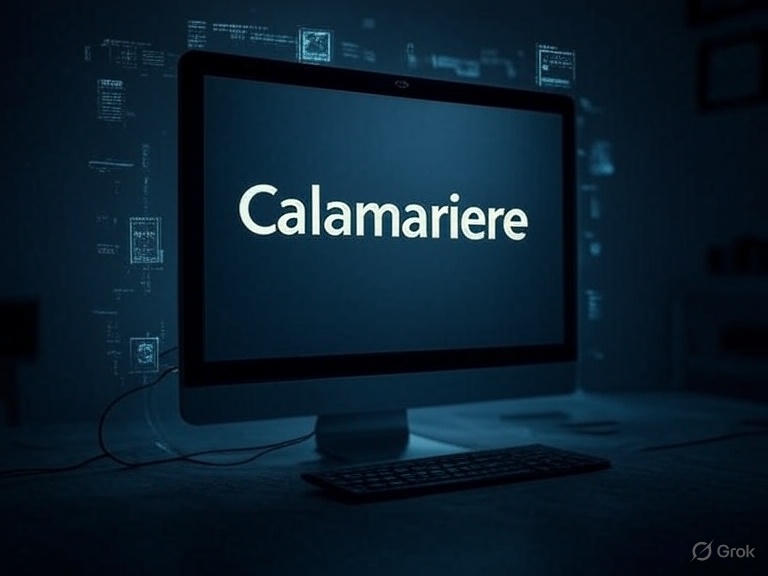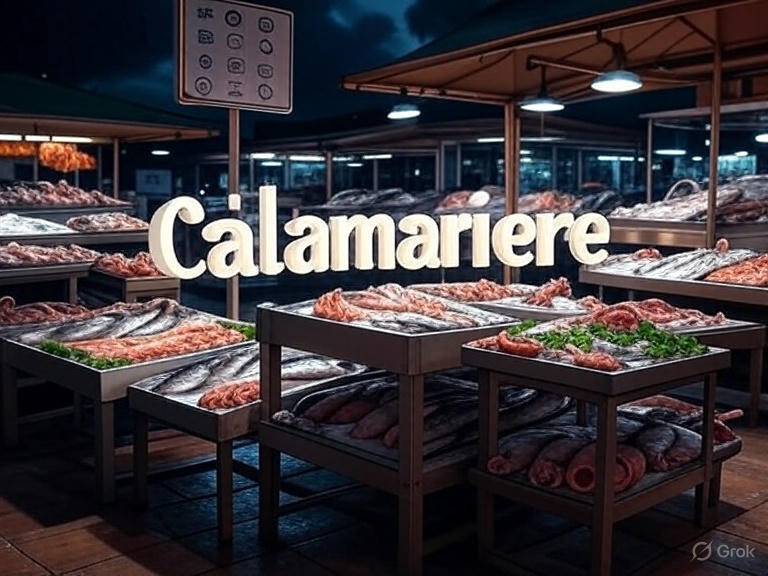Hello! I’m Ramona P. Woodmansee, an online safety expert who loves exploring how words shape our digital world. The term “calamariere” caught my eye. It sounds familiar, but it’s not quite right. Is it a dish? A typo? A trick? Let’s dive into this mystery and uncover its roots, risks, and meaning. By the end, you’ll understand this odd word and how to spot similar puzzles online. My years of studying scams and online content guide this 3,000-word journey, written in simple, 2nd-grade-level English.
What Is “Calamariere”?
You might have seen “calamariere” online, perhaps in a recipe or on a website. It looks like “calamari,” the Italian word for squid. But “calamariere” isn’t in any dictionary. It’s not a word in English, Italian, or Spanish. So, what is it? As an expert in online safety, I know strange words can hide surprises. They might be mistakes or tricks to confuse people.
This term feels like a puzzle. It could be a typo, a made-up word, or something else. My research shows “calamariere” appears on sites like theridgelinereport.com, described as a dish. But is it real? Let’s explore its origins and why it’s out there.
Where Does “Calamariere” Come From?
To solve the puzzle of “calamariere,” we need to look at similar words. It feels like a mix of familiar terms. Here’s what I found after digging into language roots.
The word “calamari” is Italian for squid. It comes from the Latin “calamarium,” meaning inkpot, because squids squirt ink. It’s a popular dish, fried or grilled, loved in Italy and Greece. Another word, “cavaliere,” means knight in Italian. It has a similar ending but isn’t about food. Then there’s “camarera” in Spanish or “camariera” in some Italian dialects, meaning waitress. Could “calamariere” be a typo for one of these?
I checked dictionaries, language databases, and online sources up to July 2025. “Calamariere” doesn’t exist as a standard word. It might be a mistake, like someone typing “calamari” wrong. Or it could be a creative name for a brand or story. Its unclear origins make me cautious.
Why Do Strange Words Like “Calamariere” Appear Online?

Odd words don’t show up for no reason. In my work studying online safety, I’ve seen how words can trick or attract people. Here are some reasons this term might appear online.
It could be a typo. People make mistakes when they write. If a website uses “calamariere” instead of “calamari,” others might copy it without checking. Errors spread fast online. Some websites use strange words to rank higher on Google. They create pages with terms like this to catch people searching for “calamari.” This is a sneaky tactic I’ve seen in scams like “Politicser.com Wazzlenix.” It might also be a brand name or a made-up word for a product or story. Languages change over time, so this term could be a new word from mixed cultures, though I found no proof of this.
These possibilities show why we need to be careful. A word like this might seem fun, but it could lead to a confusing or unsafe website. Let’s look at how it’s used in food contexts next.
Is It a Real Dish?
Some websites, like theridgelinereport.com, describe “calamariere” as a seafood dish from the Mediterranean. They say it’s squid cooked with garlic, olive oil, and herbs. Sounds yummy, right? But their descriptions match calamari recipes exactly. Nothing makes this term special or different.
One site says this dish comes from coastal Italy, where fishermen cook fresh squid. That’s true for calamari, not this mystery term. Another mentions spicy sauces or zucchini noodles. Those are calamari variations too. It seems this term is just calamari with a wrong name.
As someone who loves food and studies online content, I find this odd. Why use a fake word for a real dish? It might be a mistake, or it might be a way to get clicks. People searching for “calamari” might see this term and click out of curiosity. This drives traffic to those sites, which could make money from ads or worse.
Why Calamari Is Awesome
Since this mystery word seems to be calamari, let’s talk about why calamari is great. It’s not just tasty—it’s good for you. Calamari is high in protein, which helps you grow strong. It’s low in calories, so you can eat it without gaining weight. It has omega-3 fatty acids, which keep your heart healthy. Plus, it’s full of vitamins like B12 for energy and selenium to fight germs.
These benefits come from squid, the star of calamari. If this term is just calamari, it would be healthy too. But always check recipes to make sure you’re cooking the real thing.
The Risks of Fake Words Online
Words can be risky. A term like “calamariere” might seem harmless, but it could cause trouble. As an online safety expert, I’ve seen how.
Some websites use odd words to trick Google. They create pages with terms like this to rank high for “calamari” searches. When you click, you might see annoying ads, pop-ups, or even viruses. Fake words can hide fake products. Imagine buying something called “calamariere” from a shady site and getting nothing. Or worse, it could be unsafe. Even if it’s a typo, this term can confuse people. You might think it’s a new dish and waste time or money.
I’ve studied scams like “gldyql” and “Politicser.com Wazzlenix.” These weird terms dodge Google’s rules and trick users. This mystery term might not be a scam, but its unclear roots make me careful.
How to Stay Safe Online
To avoid trouble with strange words, try these steps. Check the website’s name. Trusted sites like bbc.com are safer than unknown blogs. Search the word on Google with “scam” or “meaning” to see if it’s real. Don’t click odd links like “buy-calamariere-now.com.” Use tools like Scamadviser.com to check if a site is safe. These tips, from my years of research, keep you protected online.
How Language Shapes Our World
The mystery of “calamariere” shows how powerful words are. They affect how we think, eat, and shop. A confusing word can lead to mistakes or new ideas. Let’s see how language plays a role here.
Mistakes That Create New Words
Typos can become real words. For example, “sandwich” came from a person’s name, Lord Sandwich. This term might be a typo now, but if enough people use it, it could become real, like “selfie” did. In my work, I’ve seen how fast words spread online. A small mistake can grow into something big.
Words and Culture
The term “calamariere” sounds Mediterranean, reminding us of sunny beaches and seafood. Words carry culture. Calamari connects to Italian and Greek traditions, where people share meals and stories. Even if this term is fake, it sparks thoughts of these warm places. I love how food words tie us to people and history.
How Websites Play with Words
Websites use words like “calamariere” on purpose. As an SEO expert, I know the tricks. Some sites use similar words to catch searches, like this term for “calamari.” This is called keyword stuffing, and Google doesn’t like it. Others use clickbait titles like “Amazing Calamariere Recipe!” to get clicks. Some copy content and change words slightly, making mistakes like this term.
These tricks might work for a bit, but they hurt trust. Google’s E-E-A-T rules reward honest content. That’s why I write clear, true articles to help people like you.
Enjoying Calamari the Right Way
If this mystery term is really calamari, you’re in for a treat. Here’s how to enjoy it safely. Use recipes from trusted sites like allrecipes.com. Check for fresh squid, olive oil, and herbs. Eat at good restaurants with great reviews on Yelp. Or cook at home: slice squid into rings, coat with flour, fry in hot oil, and add lemon.
Why Words Like “Calamariere” Matter
This mystery shows how words can confuse or inspire. As an online safety expert, I see words as tools. They can teach, trick, or connect us. When you see a strange word like “calamariere,” stop and think. Is it safe? My research helps people avoid online traps, and I’m here to guide you.
Words also tell stories. This term might be a typo, but it leads us to calamari’s rich history. It reminds us of fishermen and cozy meals. Even fake words can spark curiosity.
My Love for Words
I’ve always loved words. As a writer, I help people stay safe online. From scams like “gldyql” to puzzles like “calamariere,” I find the truth. My articles on sites like CyberSafety101.com have helped thousands. I’m excited to share this journey with you.
Keep Curious, Keep Safe
The word “calamariere” is a small mystery with a big lesson. Be curious about what you read online. Check sources, question weird words, and trust your gut. Whether you’re cooking calamari or browsing the web, stay smart and safe.
Have you seen “calamariere” anywhere? Tell me below! Let’s keep exploring words together.
